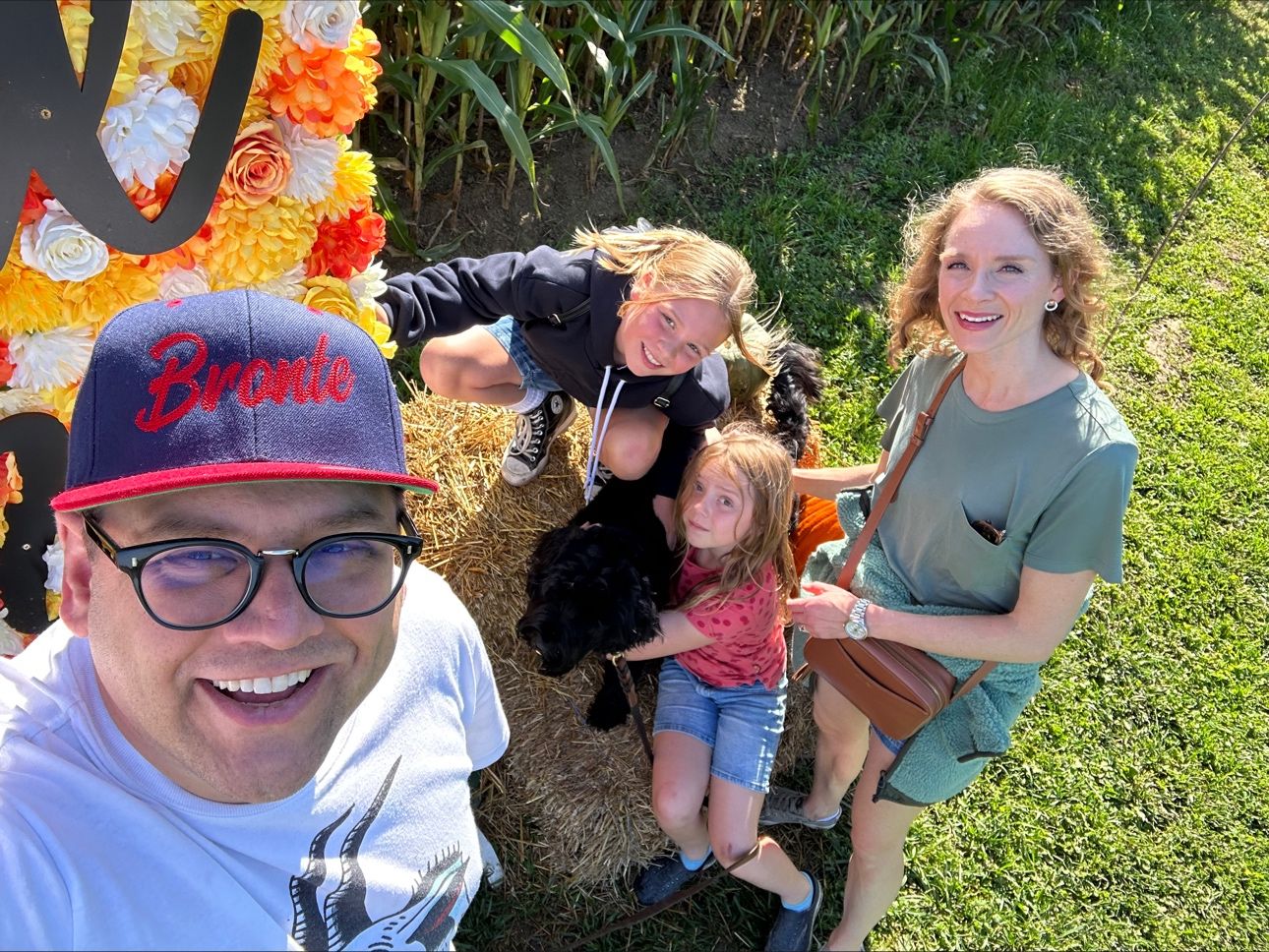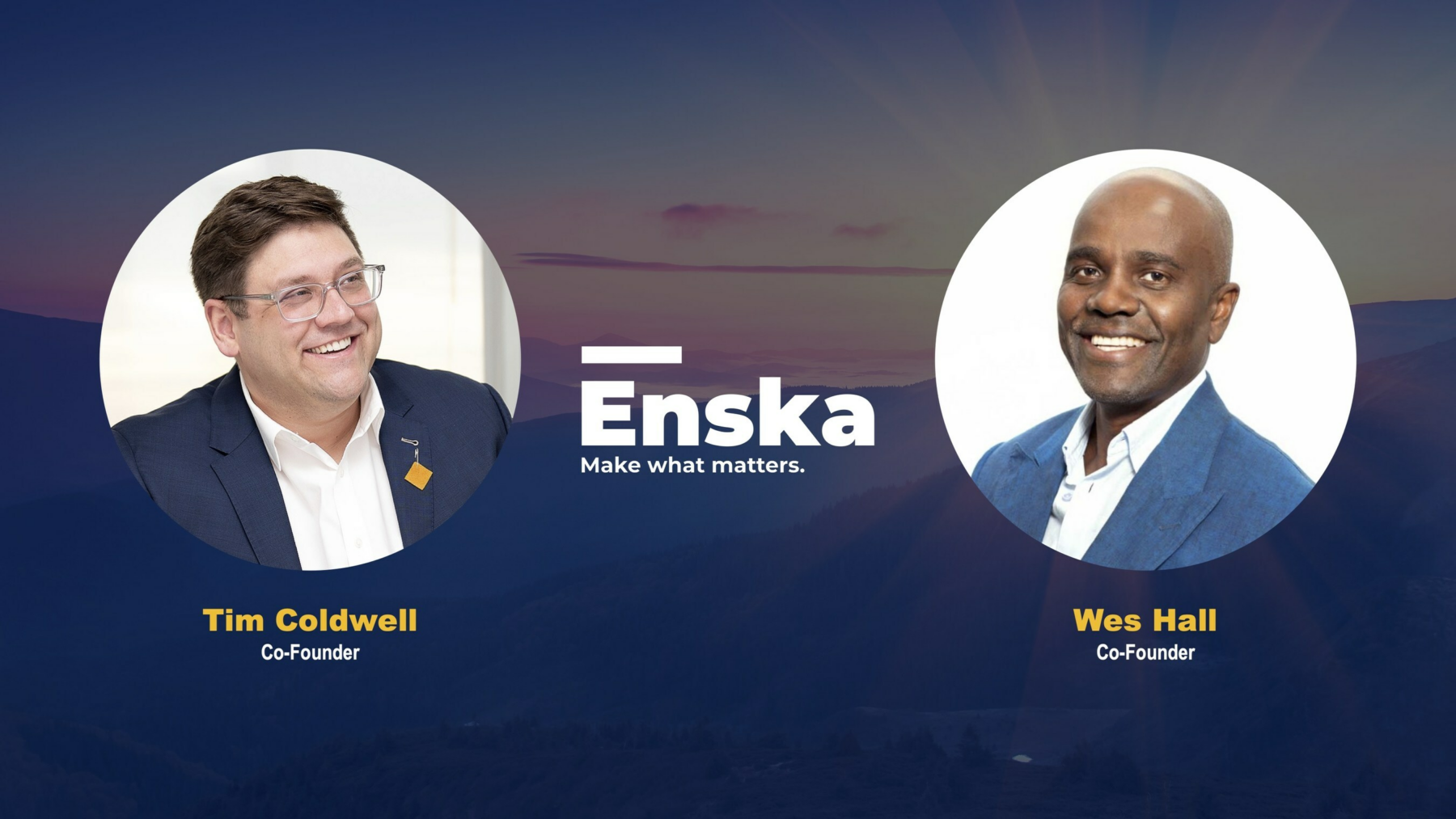The next chapter: Tim Coldwell reinvents himself one more time
The former Chandos president tells the story behind his radical career change.

Tim Coldwell, left, with his wife Angela and his children.
From precarious circumstances to the helm of one of Canada’s largest and most innovative general contractors, Tim Coldwell’s journey has been nothing short of remarkable. Now, he’s done something even more surprising—he’s reinvented himself once again.
“Over my years at Chandos, I have reinvented myself several times,” he wrote in a farewell message months ago. “Having the courage to do so has been an important part of my story. But this time, the reinvention could only happen outside of Chandos, the company that has given me so much. Having accomplished my goals at Chandos, it is time to reinvent myself once again. And so, I depart Chandos to write my next chapter.”
During his tenure, Coldwell was a driving force propelling the company to the forefront of progressive contract models such as IPD. His legacy includes working with the team to take the company national and more than doubling enterprise value all while pioneering social procurement and spearheading Chandos’ achievement as the largest B-Corp certified national technical builder in the world.
What prompted the urge to reinvent himself? Coldwell explained that as a 41-year-old man reconnecting with his Indigenous roots, he found his worldview beginning to change. He wanted to have an impact on the world that went beyond his seat in a corporate boardroom.
Indigenous Roots
Coldwell didn’t know about his Indigenous heritage growing up.
“It wasn’t something we talked about,” he said. “In 1985, Bill C-31 was passed to abolish enfranchisement and restore status to those who had lost status through enfranchisement. As a result, I gained status as a member of the Mohawks of the Bay of Quinte. It was my aunt who told me stories about my ancestors. I am a direct descendant of several prominent Mohawk leaders who shaped Canada”
Coldwell explained that his family and many of my friends wanted him to follow in the steps of his father, uncle and grandfather to become a member of the clergy.
“I’ve always had an appreciation for people who dedicate their lives in service to others,” he said. “But the clergy wasn’t for me. I wondered if I could be of service in other ways. Most importantly, I wanted to be true to myself.”
After finding work at a lumber mill, it was the Mohawks of the Bay of Quinte that gave him his first big break: a scholarship to attend engineering at the University of Alberta which he used to launch his career at Chandos. But that disconnection from his Indigenous roots lingered from his childhood.
“It’s like gravity. There is this pull that makes me want to learn the culture that I had been separated from,” said Coldwell. “Many Indigenous people have a spiritual connection to the land. I remember fly fishing in the Grand River for the first time and standing on Forester’s Island in Tyendinaga where my grandparents once lived. There is a powerful sense of connection to ‘this place’ that comes over me. It’s hard to explain.”
He explained that the folks at the First Nations Technical Institute in Tyendinaga treated him like a long lost family member.
“They introduced me to Chief Don Maracle who signed the letter that changed my life by telling me the Mohawks of the Bay of Quinte would support my education,” said Coldwell. “I took my family to their first Pow Wow at Six Nations. I met cousins that I never knew I had. There is no question that I would not be where I am today if it weren’t for help from the Mohawks of the Bay of Quinte. I’ve got to pay that forward the best I know how.”
Coldwell is now on a journey to learn Indigenous values and ways of being.
“A colonial worldview is rooted in the idea of ownership – ‘that’s mine’,” says Coldwell. “An Indigenous worldview says these things are shared – it’s ours. Colonialism measures status and prestige by what you own and what you accumulate. For traditional Indigenous people, status and prestige is about what you give away to your community. Think about that. I’m starting to get my head around it.”
He explained that unlike Western society, which believes each child is born with rights, the Mohawk believe that each person is born with a number of responsibilities.
“To themselves, to their families, to their Nation and to the natural and spiritual worlds around them,” said Coldwell. “You don’t have any rights until you have fulfilled your responsibilities. A colonial worldview is ‘me first’ while an Indigenous perspective is ‘others first’.”
Make What Matters
When thinking about his reinvention, Coldwell had lots of options. But he knew he wanted to continue his mission to use business as a force for good. The answer came after meeting legendary businessman and “Dragon’s Den” investor Wes Hall who Coldwell got to know after being named a Canadian Entrepreneur of the Year in 2021.
“Wes’ story is amazing,” said Coldwell. Hall grew up in a tin shack in Jamaica. Every day, he went to school barefoot because his family couldn’t afford to buy him shoes. After moving to Toronto as a teenager, Hall got a job in the mailroom of a prominent law firm and went on to found Kingsdale Advisors and many other businesses. Beyond his business success, Hall has used his connections and influence to combat systemic racism.

“I knew I would learn a lot from Wes, so I sought him out and we started chatting about the idea of a real estate advisory business that would use the power of real estate supply chains to build a more inclusive society, a society where nobody is left behind,” said Coldwell. “What if we could reduce development costs for our clients and address Canada’s skilled trade shortage by using supply chains to bring hope and opportunity to thousands of youth? What if we did that?”
The result is Énska Advisors, a new venture the pair are launching this week. The word Énska means “one” in Mohawk and has layered meaning. He explained that a fundamental Mohawk value is being of “one mind” when making decisions, the idea of having one life to live, the realization that we are all one. “We chose this name because one person, project, or company can start a movement and because we recognize that we can’t do it alone,” said Coldwell. “True systemic change only occurs when we do it together, as one.”
Building a Legacy
Coldwell explains that the value proposition of the firm is simple. Énska reduces development costs while simultaneously delivering third-party verified social and environmental outcomes at zero premium cost. This allows the firm’s clients to confidently report project benefits. “Doing the right thing often comes with a price tag,” says Coldwell. “Énska plans and governs the project so there is no premium.” Énska Advisors has three primary service offerings:
- Real Estate Advisory – Site selection, project business case development, obtaining funding and developing supply chain strategies to reduce costs and maximize impact.
- Project Governance – Assembling high-performing teams and governing projects with visionary leaders who have executive presence and industry knowledge.
- Indigenous Capital – Accelerating economic self-determination by advising First Nations entering the real estate, construction or clean energy businesses.
The firm has also adopted what they call the “Fifty by 50” initiative to address Canada’s skilled trades shortage. Coldwell and Hall’s goal is to start a movement that provides 50,000 youth by 2050 with the same life-changing opportunities they received. Coldwell believes that he isn’t just trying to build a company. He is trying to build a legacy that will be making a difference long after he is gone in keeping with Indigenous teachings.
“There is a concept called the Seven Generation Principle,” says Coldwell. “It’s this idea that the decisions you make today should benefit your descendants seven generations in the future. “I’m a big fan of the musical Hamilton. There’s this line at the end, ‘And when my time is up, have I done enough? Will they tell my story?’ I’m interested in asking, ‘what must we do today so people living seven generations from now will tell our story in a good way?’”
Coldwell wants to measure his life by impact.
“This idea of impacting 50,000 youth by 2050 is the kind of life goal I can get behind,” he said. “I’d like my tombstone to say, ‘loving husband, father and business leader who proved that you can be wildly successful by using business as a force for good.’ Too many people get trapped in either/or thinking. Purpose or profit. There is a way to have both. Purpose and profit. We only have one life to live. Let’s make it matter.”

